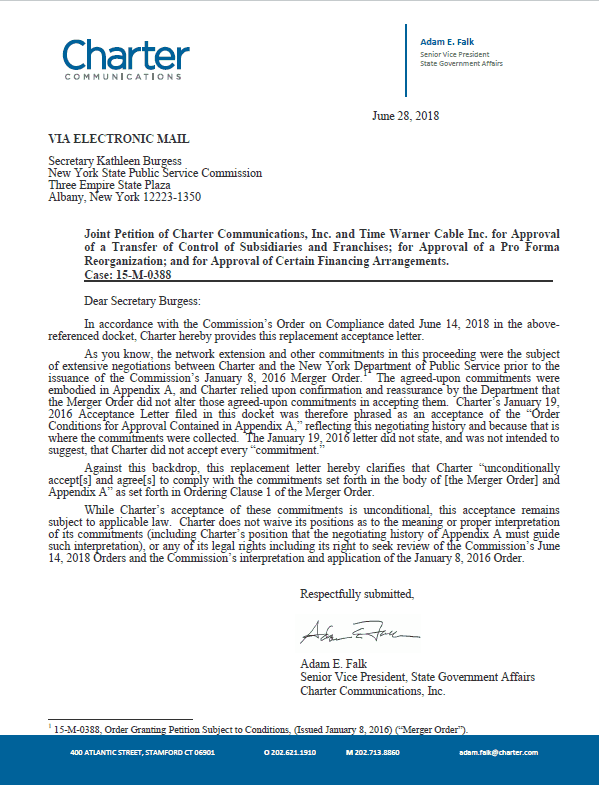 Two weeks ago, New York State’s telecommunications regulator gave Charter Communications 14 days to fully and unconditionally agree to the terms and condition of the 2016 Merger Order that granted the cable company permission to acquire Time Warner Cable. On the last day, hours before the deadline expired, Charter agreed, sort of.
Two weeks ago, New York State’s telecommunications regulator gave Charter Communications 14 days to fully and unconditionally agree to the terms and condition of the 2016 Merger Order that granted the cable company permission to acquire Time Warner Cable. On the last day, hours before the deadline expired, Charter agreed, sort of.
“This replacement letter hereby clarifies that Charter ‘unconditionally accept[s] and agree[s] to comply with the commitments set forth in the body of [the Merger Order] and Appendix A’ as set forth in Ordering Clause 1 of the Merger Order,” wrote Adam E. Falk, senior vice president for state government affairs at Charter Communications.
Unwilling to stop there, Falk decided to make the unconditional acceptance… conditional.

“While Charter’s acceptance of these commitments is unconditional, this acceptance remains subject to applicable law,” Falk wrote. “Charter does not waive its positions as to the meaning or proper interpretation of its commitments (including Charter’s position that the negotiating history of Appendix A must guide such interpretation), or any of its legal rights including its right to seek review of the Commission’s June 14, 2018 Orders and the Commission’s interpretation and application of the January 8, 2016 Order.”
That final paragraph signals the Public Service Commission/Department of Public Service that Charter intends to continue insisting that the language in Appendix A governs, defines, and characterizes the entire Merger Order — an argument the Commission had refused to accept because it gave a foundation for Charter officials to claim they were in full compliance with their commitment to roll out service to an additional 145,000 unserved New York residents. Appendix A omits the purpose and intent of the expansion commitment, explained elsewhere in the Merger Order as providing broadband service in New York’s unserved rural areas. Charter had attempted to count as “new passings” any new expansion of its cable lines, including those in wealthy gated communities and upscale condos, refurbished apartments in New York City, and new housing developments — all likely to receive service without the Merger Order.


 Subscribe
Subscribe